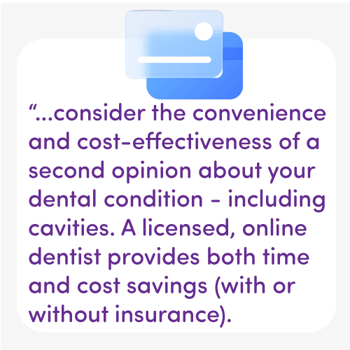You may have heard that “prevention is the best medicine.” That could be true for a variety of scenarios.
Identifying and treating dental cavities is one of them. If you think you have one, been told you do, or want a second opinion about cavities - prevention matters.
What is a tooth cavity (and what causes them)?
Cavities are another way to describe tooth decay. Basically, decay is the issue.
The ADA (American Dental Association) describes the condition:
”Cavities, or tooth decay, is the destruction of your tooth enamel, the hard outer layer of your teeth.” [1]
“Destruction” can seem like a strong word. And it is when you consider the damage that oral bacteria can do to your teeth.
Bacteria thrive on your tooth surfaces. The sticky film of bacteria (plaque) forms as result of the sugar content you eat and drink.
Acid is produced and released. The sticky nature of plaque keeps the acids in direct contact with your teeth.
Over time the acids break down your tooth enamel. And…a cavity can form creating a small hole in your tooth.
What you might hear from a dentist about cavities
”You can prevent cavities.”
Preventive dental care is your best “defense” against cavity formation. Your dentist will likely inform you about the common cavity prevention routines.
- Brush a minimum of two times per day.
- Floss your teeth daily to help remove plaque from between your teeth and gums.
- Schedule regular dental check-ups.
- Eat healthy and limit foods that are high in starch and sugar.
- Use toothpaste and other dental care products that contain fluoride.
”Cavities can be treated.”
The size and/or severity of your cavity will determine the treatment that’s recommended. Cavities might not reveal symptoms so it’s useful to have your teeth or area of concern x-rayed and visually checked.
The primary treatment for a cavity requires removal of the decayed portion of your tooth and placement of a dental filling or a crown. A secondary and more extensive treatment could involve a root canal if the pulp or root of your tooth is severely damaged by decay.
Root canal therapy removes the internal, damaged portion of your tooth. The pulp that remains will be cleaned, filled, and sealed.
”Cavities can be misdiagnosed”
On occasion you might desire a second opinion about a cavity diagnosis. A few factors could lead to you requiring a secondary diagnosis related to a cavity.
- The treatment protocols of your previous dentist including how “conservative” they are about diagnosing certain conditions.
- Cavity detection protocols such as x-rays or other diagnostic tools.
- Discrepancies between what’s considered “normal” or “decayed” tissue.
Again, preventive dental care and monitoring your diet will help prevent cavities. Seek a dental consultation if you suspect you might be experiencing tooth decay.
Also consider the convenience and cost-effectiveness of a second opinion about your dental condition - including cavities. A licensed, online dentist provides both time and cost savings (with or without insurance).
- You can ask questions about your dental issue on a secure, easy-to-use online platform.
- You can support your questions with available health records, images, and the information from an initial or previous diagnosis.
- You can get a second opinion based on the information you provide and that’s received from the online dentist.
- You can compare the diagnoses and make a decision about your treatment option(s).
- You have the option of scheduling an in-office appointment for treatment from a recommended, licensed dentist.
This is available to you with secure, digital, convenient access on an internet connected device or computer. And with the potential of investing less time and cost.
The Dental.com team of dental professionals are trained to identify, diagnose, and treat any dental condition. From toothaches to second opinions - you’re covered!
- Access a 24 hour dentist now from your personal, private, and secure account.
- Select a reason for your visit using a brief questionnaire.
- Receive virtual dental care from a licensed dentist when you provide your issue details, any photos, and/or dental/health records.
Discover more about Dental.com on our How it Works page. Or Register Now.
